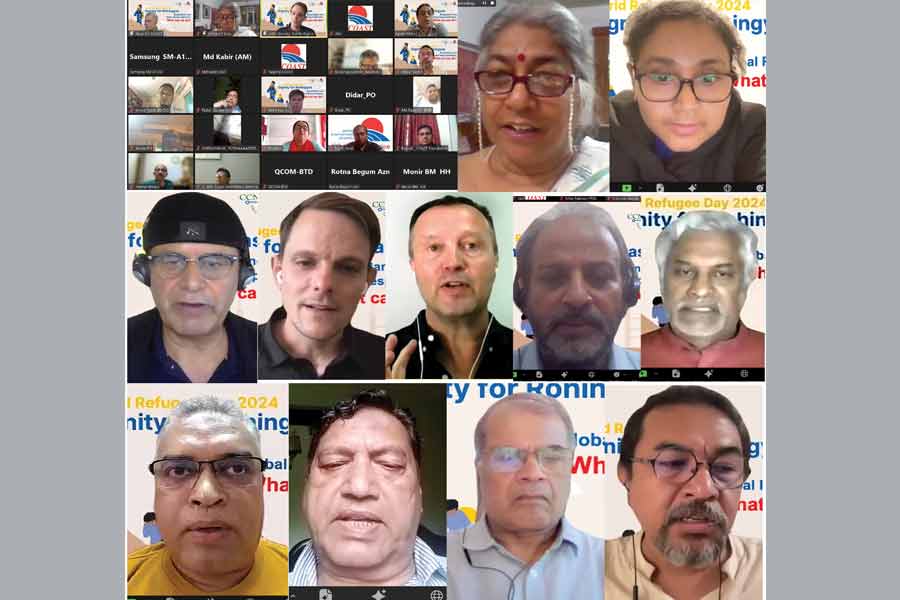
Published :
Updated :

Civil society organisations (CSOs) at an international webinar on Thursday emphasised the need for formal recognition of Rohingya refugees, highlighting that such recognition could address numerous challenges faced by the community.
The webinar was organised by the Coast Foundation and Cox's Bazar CSO-NGO Forum (CCNF) on the eve of World Refugee Day, according to a press release.
While Bangladesh has shown great compassion by sheltering a million Rohingya refugees, the speakers argued that formal recognition is now essential.
The seminar, chaired by Shireen Haque of Naripokkho and moderated by Rezaul Karim Chowdhury of the Coast Foundation, featured national and international refugee experts.
Among the speakers were Klaus Dick Nielsen and Hafsar Tamizuddin of the Asia Pacific Refugee Rights Network (APRRN), Gopal Siwakoti of InHUREED International, John Quinley of Fortify Rights, Gawhar Naeem Wahra of Disaster Forum, refugee and migration expert Asif Munir, Arifur Rahman of YPSA, Fazlul Qader Chowdhury of Cox’s Bazar Zilla Press Club, and representatives from CCNF.
Barkat Ullah Maruf of the Coast Foundation presented the keynote address.
The keynote highlighted that although Rohingya children receive education, they lack motivation due to the absence of internationally recognised certificates.
Maruf stressed that travel documents for the Rohingyas would enable them to seek legal employment abroad, reducing the need for perilous journeys across the Andaman Sea.
Klaus Dick Nielsen of APRRN emphasised the importance of international agencies funding local NGOs in Cox's Bazar to support the Rohingya response effectively.
APRRN's Secretary General Hafsar Tamizuddin noted the ongoing persecution of the Rohingya in Myanmar and called for greater international transparency in discussions about their plight.
John Quinley of Fortify Rights underscored the importance of refugees' rights to assembly and freedom of expression, pointing out that these rights are often suppressed.
He argued that Rohingya families should have the right to relocate if they face security risks in the camps.
Drawing parallels with Bangladesh’s own history, Gawhar Naeem Wahra of Disaster Forum recalled how India recognised ten million Bangladeshi refugees in 1971 without ratifying the Geneva Convention.
He suggested that Bangladesh could similarly benefit from formally recognising Rohingya refugees, potentially increasing foreign remittances through legal channels.
Asif Munir highlighted the negative perceptions among law enforcement towards Rohingyas, which he argued contributes to ongoing conflicts within the camps.
He suggested that a comprehensive disarmament process, potentially involving the Ministry of Defense, could be necessary to ensure peace.
Gopal Siwakoti of InHUREED International praised Bangladesh's magnanimity in sheltering such a large refugee population despite its own challenges as a least developed country (LDC).
Rezaul Karim Chowdhury of the Coast Foundation asserted that repatriation remains the only viable solution to the Rohingya crisis, urging international agencies to initiate meaningful repatriation efforts.
He also emphasised the potential role of the Rohingya diaspora in facilitating this process.


 For all latest news, follow The Financial Express Google News channel.
For all latest news, follow The Financial Express Google News channel.